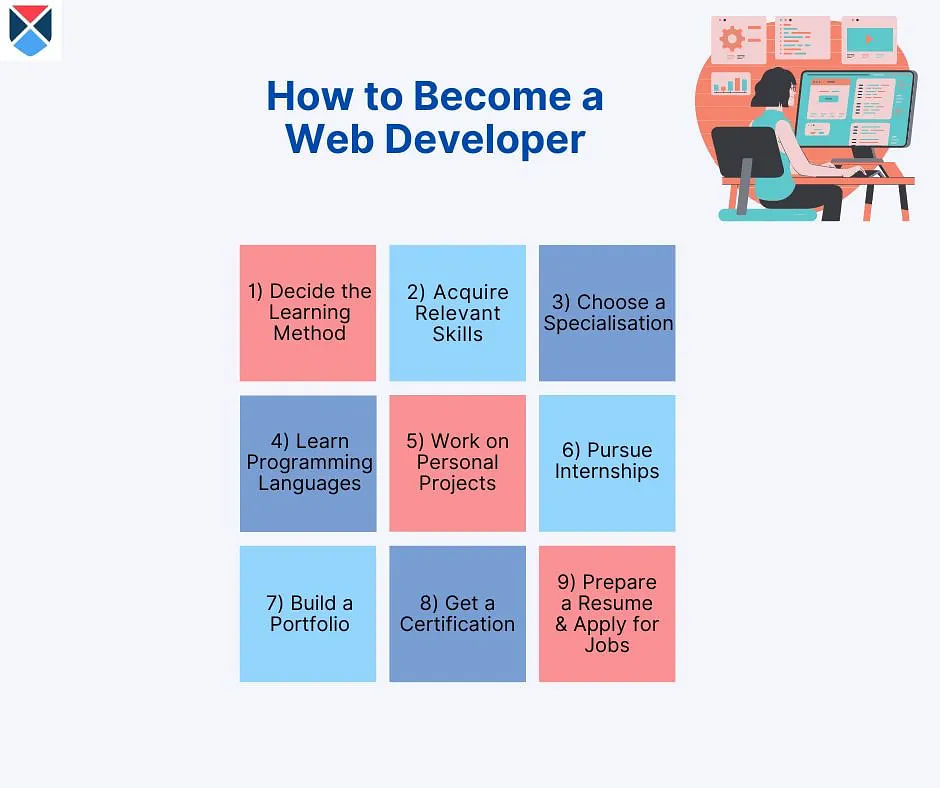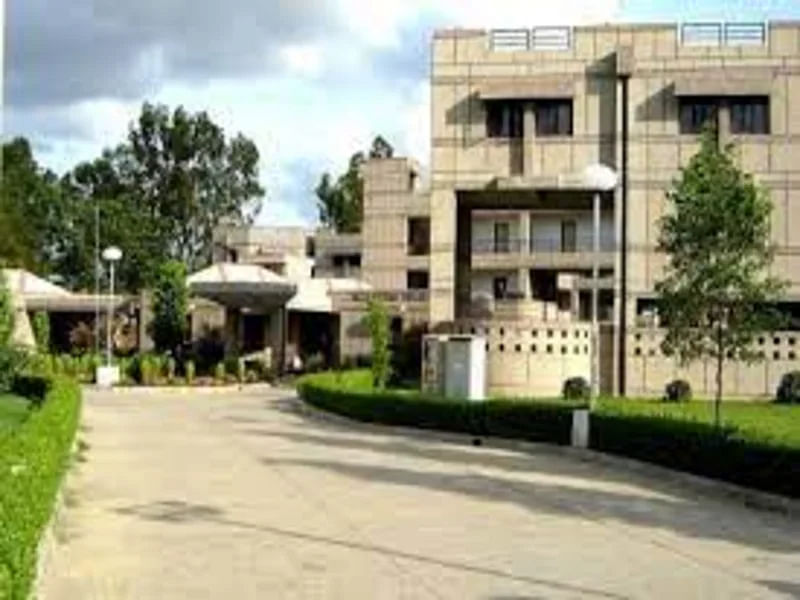Is being a Web Developer your dream career option? Check out the complete step by step process on how to become a Web Developer, Eligibility, Exams, Skills Required and Salary in 2023.
A web developer is a tech professional who makes use of programming languages to build and maintain websites and web applications. With technological advancement and increased use of web-based applications, there is a rapid growth in the demand for web developers in India. Hence, the field of web development offers a plethora of career opportunities for all tech enthusiasts.
Candidates can begin their journey to become a web developer by finishing 10+2 in the science stream. There is no set eligibility for web developer, and therefore candidates can gain the necessary knowledge and skills through one of the many learning pathways available. They can opt for formal education at universities, pursue web development courses online, attend professional boot camps, or earn appropriate certifications. Further, gaining relevant experience through personal projects and internships is essential to build a career in this field.
Table of Contents
- How to Become a Web Developer in India?
- Who is a Web Developer?
- How Much Time Does it Take to Become a Web Developer?
- Web Developer Roles and Responsibilities
- Web Developer Salary in India
- Top Companies Recruiting Web Developers in India
- Best Employment Sectors for Web Developers
- Future Scope of Web Development in India
- Benefits and Drawbacks of Becoming a Web Developer
How to Become a Web Developer in India?
The basic qualification of a web developer is the completion of class 12 in the science stream. Becoming a proficient web developer requires aspirants to have relevant knowledge, skills, and real-world experience. The detailed step-by-step process on how to be a web developer is provided below.
- Step 1: Decide the Learning Method
- Step 2: Acquire Web Developer Skills
- Step 3: Select a Web Development Specialisation
- Step 4: Learn Programming Languages
- Step 5: Work on Personal Projects
- Step 6: Pursue Internships
- Step 7: Build an Attractive Portfolio
- Step 8: Opt for a Web Developer Certification
- Step 9: Prepare a Resume and Apply for Jobs
Step 1: Decide the Learning Method
There are no set web developer qualifications, and therefore aspirants must figure out which educational path suits them the best. They can consider factors like cost, time, teaching format, learning support, career assistance, etc., and accordingly make a decision. The following are a few of the general learning pathways for aspiring web developers:
Formal Education
To get started with their web developer career, a candidate should complete his/her senior secondary education. It is a must for candidates to study subjects like Physics, Chemistry, Mathematics/Biology in 10+2. Additionally, they should score a minimum of 50% marks.
Post finishing class 12, candidates can choose to pursue a bachelor’s course at a web development institute in India. To get admission, they need to appear for entrance exams like JEE Main, JEE Advanced, UP CET, WBJEE, VITEEE, KEAM-EE, BISAT, or SRMJEEE. Candidates can pursue any of the below-mentioned undergraduate courses to become a web developer. Also, review the web development courses fees and duration details.
|
Course |
Duration |
Average Course Fees (INR) |
|
B.Sc in Computer Science |
3 years |
INR 25,000-2,00,000 |
|
B.Sc in Electronics |
3 years |
INR 10,000-2,00,000 |
|
B.Tech in Computer Science |
4 years |
INR 2,00,000-5,00,000 |
|
B.Tech in Information Technology |
4 years |
INR 2,00,000-5,00,000 |
|
B.Tech in Electrical Engineering |
4 years |
INR 2,00,000-5,00,000 |
|
B.Tech in Electrical and Electronics Engineering |
4 years |
INR 2,00,000-5,00,000 |
|
B.E. in Electrical Engineering |
4 years |
INE 2,00,000-4,50,000 |
|
BCA |
3 years |
INR 50,000-3,00,000 |
Some companies prefer to hire web developers who possess a bachelor’s degree in the relevant field. Moreover, most of the web development courses after the 12th require aspirants to pursue internships or work on projects in the final year. This can be a great value addition to the candidate’s resume.
If candidates are looking to specialise in a specific web development area, then they can also pursue a master’s degree after finishing their undergraduate studies. Also, there might be certain companies for which a postgraduate web development qualification is the minimum requirement for specific posts. Now, check out the list of top master’s web development courses.
|
Course |
Duration |
Average Course Fees (INR) |
|
M.Sc in Computer Science |
2 years |
INR 30,000-3,50,000 |
|
M.Sc in Electronics and Communication Engineering |
2 years |
INR 30,000-1,20,000 |
|
M.Tech in Computer Science |
2 years |
INR 50,000-6,00,000 |
|
M.Tech in Information Technology |
2 years |
INR 50,000-2,00,000 |
|
M.Tech in Computer and Information Science |
2 years |
INR 50,000-6,00,000 |
|
MCA |
2-3 years |
INR 30,000-2,00,000 |
Self-paced Learning
Aspirants can learn web development fundamentals, principles, software, and processes at their own pace. The following tips will help them study effectively:
- Review web development books to understand the concepts
- Participate in online coding challenges
- Check out short web development online training modules
- Join communities related to web development and coding online to get guidance
- Take classes concerning web development, including programming and graphic design.
This is a good learning alternative for aspirants to start with. However, they might need to pursue formal degrees, join boot camps, or get a web developer certification to gain better knowledge & master the necessary skills.
Professional Boot Camps
Boot camps for web development are streamlined training courses wherein candidates can understand coding fundamentals in various languages, including CSS, Javascript, HTML, etc. They are also taught the methods of translating user requirements into well-structured and appealing designs. Essentially, these programs are suitable for candidates who wish to pursue short-term web development courses to get employment.
Step 2: Acquire Web Developer Skills
A good web developer has the zeal to learn continuously and uses the best web development practices. At the same time, he/she is proficient in writing code and fluent in various programming languages. Following are the soft and hard skills required to become a web developer.
|
Soft Skills |
Technical Skills |
|
Analytical Skills |
Coding and Programming |
|
Interpersonal Skills |
Knowledge of Project Management Tools |
|
Problem-Solving Skills |
Back-end Basics |
|
Time Management Skills |
Testing and Debugging |
|
Communication Skills |
Data Analysis |
|
Decision-Making Skills |
Deductive Reasoning |
|
Attention to Detail |
Numerical Ability |
|
Active Learning |
SEO Strategy |
|
Critical Thinking Skills |
Testing and Debugging |
|
Organising Skills |
User Interface Design |
|
Patience |
Database Management |
Candidates should also be adept in using the following web development tools to be a web developer:
- Chrome DevTools: Helps web developers check, edit, and rectify their code and track the performance of their web pages.
- Sass: Useful for accessing the functionality of the existing CSS of a site, like variables, nested rules, functions, inheritance, variables, etc.
- CodePen: One of the most used web development tools, it assists in the front-end working of the web pages.
- Grunt: Web developers use this tool to carry out redundant procedures like unit testing, compilation, minification, etc.
- GitHub: It allows developers to manage multiple projects by helping them devise various review processes for the written code.
- jQuery: With the support of this tool, web developers can easily use JavaScript on their websites.
- BootStrap: Facilitates smooth development of mobile applications.
- Envato: It is a frontend development tool that provides various built-in HTML5 templates
- Sublime Text: Aids developers in the process of coding and markup, along with cross-platform editing and customisations based on the project.
Step 3: Select a Web Development Specialisation
The next step in the web developer career path is to select an area of specialisation. The web developer job description varies according to the web development specialisation opted for by the candidate. Based on their specialisation, the following are the major types of web developers in India:
- Frontend Developer: Frontend developers look into the user interface and user experience of the websites. They use coding languages to work on the content, colour coordination, images, text layout, clickable buttons, etc., present on the website.
- Backend Developer: These web developers ensure the proper functioning and maintenance of a website. They must have knowledge of backend coding languages like Java, PHP, and CSS.
- Full-stack Developer: Their expertise lies in working on the backend as well as the front end of the website.
Step 4: Learn Programming Languages
Moving ahead, a candidate must master the following programming languages to pursue a career as a web developer. However, after choosing a specialisation, they can particularly focus on the web development languages that are suitable for them.
- Hypertext Markup Language (HTML)
- Cascading Style Sheets (CSS)
- JavaScript
- Python
- Structured Query Language (SQL)
Step 5: Work on Personal Projects
The more aspirants practice, the more they will learn in the field of web development. They can take up independent projects or work on freelance projects to get hands-on experience. Writing codes and using various programming languages and web development tools on a regular basis will work wonders for aspiring web developers.
Step 6: Pursue Internships
Candidates should pursue a web developer internship in their journey to become a web developer. This will help them apply their knowledge and improve their skills along with gaining industry experience. Some of the degree programs in web development offer internship placements. However, candidates can also check online platforms or reach out to their professional network to get suitable internship opportunities.
Step 7: Build an Attractive Portfolio
Individuals must then prepare a web developer portfolio that demonstrates their strongest skills. The portfolio should not just exhibit their best work but also showcase their versatility. Moreover, it must reflect the unique qualities of the candidate and the way he/she approaches various problems. Therefore, keeping these aspects in mind, candidates should add their web development work to the portfolio.
Step 8: Opt for a Web Developer Certification
Earning a certification in web development will help candidates improve their skills, and at the same time, it will add value to their resume. Further, it will also assist them in staying up to date with the latest developments in the field. Here we have listed the top certifications that candidates can pursue as aspiring web developers.
- Certified Software Testing Professional
- Certified XML Developer
- Certified PHP Developer
- PHP and MySQL Training
- JavaScript and JQuery Essentials Training and Certification
- AWS Development Certification Train
- Agile Software Development
Step 9: Prepare a Resume and Apply for Jobs
The resume of a web developer must be clear and concise, highlighting all the qualifications and skills that make him/her stand out. Candidates must mention their programming and coding abilities, professional experience, and other technical competencies.
Aspirants must now start searching for suitable web developer jobs. The updated resume should be uploaded on job search platforms, and candidates must begin preparing for interviews. They can work as web developers in software companies, marketing firms, advertising agencies, publishing houses, and many more.
Who is a Web Developer?
A web developer mainly works on website creation and maintenance using web development languages like HTML, Javascript, and CSS. Web developers look into the technical aspects like speed, traffic, & capacity to assess a website’s performance. Moreover, they work on producing suitable content for websites.
How Much Time Does it Take to Become a Web Developer?
The time taken to be a web developer differs based on the knowledge, experience and skillet of the candidates. Moreover, it also depends on the learning pathway chosen by the candidates. If an individual considers pursuing a formal bachelor’s degree course in web development, it will take four years to complete. However, if they choose to pursue a certification, it might last for a few months only.
Web Developer Roles and Responsibilities
Web developers work on designing and maintaining the website using codes and programming languages. Check out key web developer responsibilities through the points given below.
- Designing new websites based on the user needs
- Assisting designers in making themes and graphics for the web pages
- Writing codes and using web development languages and technologies
- Modifying the existing website based on the latest trends
- Working on frontend and backend of websites
Web Developer Salary in India
The web developer salary in India for freshers is approximately INR 2,94,555 PA. The salaries can differ for web developers based on their experience, expertise, and job profile. Tabulated below are the experience-wise salary details for the candidate’s reference:
|
Level |
Experience |
Average Annual Salary (INR) |
|
Entry-Level Web Developer |
Less than 1 year |
INR 2,94,555 |
|
Early Career Web Developer |
1-4 years |
INR 3,47,823 |
|
Mid-Career Web Developer |
5-9 years |
INR 5,83,508 |
|
Experienced Web Developer |
10-19 years |
INR 9,00,000 |
|
Late Career Web Developer |
20+ years |
INR 12,00,000 |
In accordance with the specialisation or job profile of the web developer, here is the salary information:
|
Job Profile |
Average Annual Salary (INR) |
|
Front-end Web Developer |
INR 5,11,331 |
|
Back-end Web Developer |
INR 4,96,516 |
|
Full-stack Web Developer |
INR 7,81,832 |
Top Companies Recruiting Web Developers in India
Top organisations in the country offer plenty of web developer jobs for freshers. The following are the leading companies in India that hire skilled web developers:
- Indo Asian Buildcon Pvt. Ltd.
- Interface Solutions
- Cognizant
- ORACLE
- Lava
- Virtusa
- HCL
- Value Media
- Mindteck
- Wipro
- IDC Technologies Solutions India Pvt Ltd
Best Employment Sectors for Web Developers
There are numerous employment opportunities in India available in the private and government sectors for web developers. Listed below are the top sectors and organisations that hire web developers from across the country.
- Manufacturing
- Retail
- Entertainment
- Education
- Banking and Insurance
- Advertisement Agencies
- Supply Chain
- Hospitality
- Travel
- Software companies
- Educational Institutions
- Publishing houses
- Audio-visual media firms
- Marketing Companies
- Department stores
- Printing and typesetting organisations
- Government and quasi-government organizations
Future Scope of Web Development in India
There is a broad web developer scope in India as the field of web development is growing exponentially. The demand for web developers has increased due to significant advancements in technology and the rise in the usage of web applications in recent years. Subsequently, there will be a surge in the number of web developer job opportunities in the near future.
Benefits and Drawbacks of Becoming a Web Developer
There are many benefits of being a web developer. However, it is important for candidates to note the drawbacks as well if they are entering this field.
Benefits of Becoming a Web Developer
A candidate should choose the web development career for the following reasons:
- There is huge growth in the IT sector, and web developers get well-paying jobs in the industry.
- Since the IT sector is growing, there is job security in the field of web development, and it is an ideal career to pursue.
- Candidates get to learn continuously and hone their technical and problem-solving skills.
- The nature of the job is dynamic, and candidates get a unique experience with each project.
Drawbacks of Becoming a Web Developer
Here are some drawbacks in the web developer career path that candidates must take note of:
- A career in web development requires candidates to work on multiple codes and learn a number of programming languages. Sometimes, it can be stressful and time-consuming for individuals to master these skills.
- There are long working hours in this field, which can make it difficult for candidates to find a work-life balance.
- The work environment of a web developer involves high pressure due to tight deadlines and schedules.














POST YOUR COMMENT